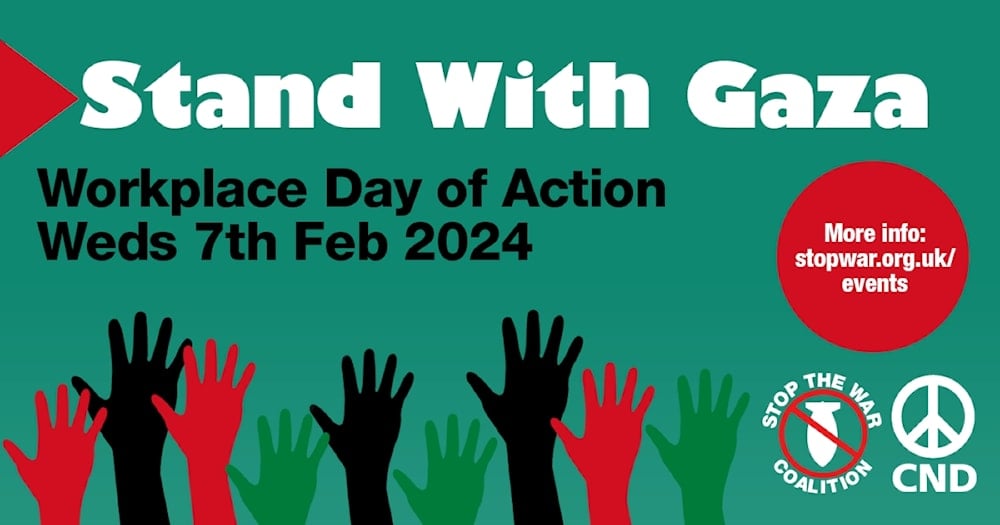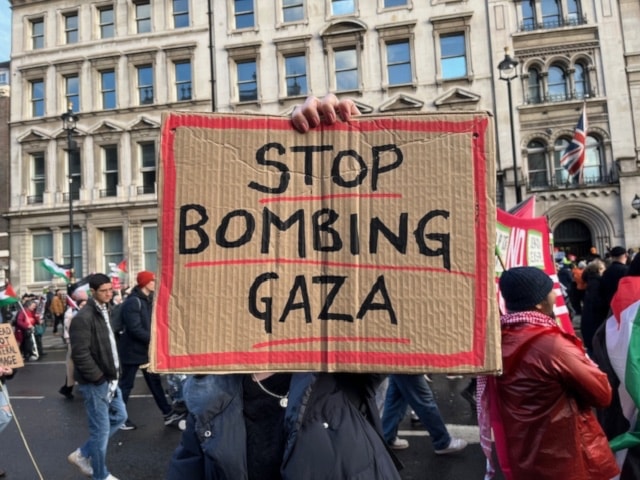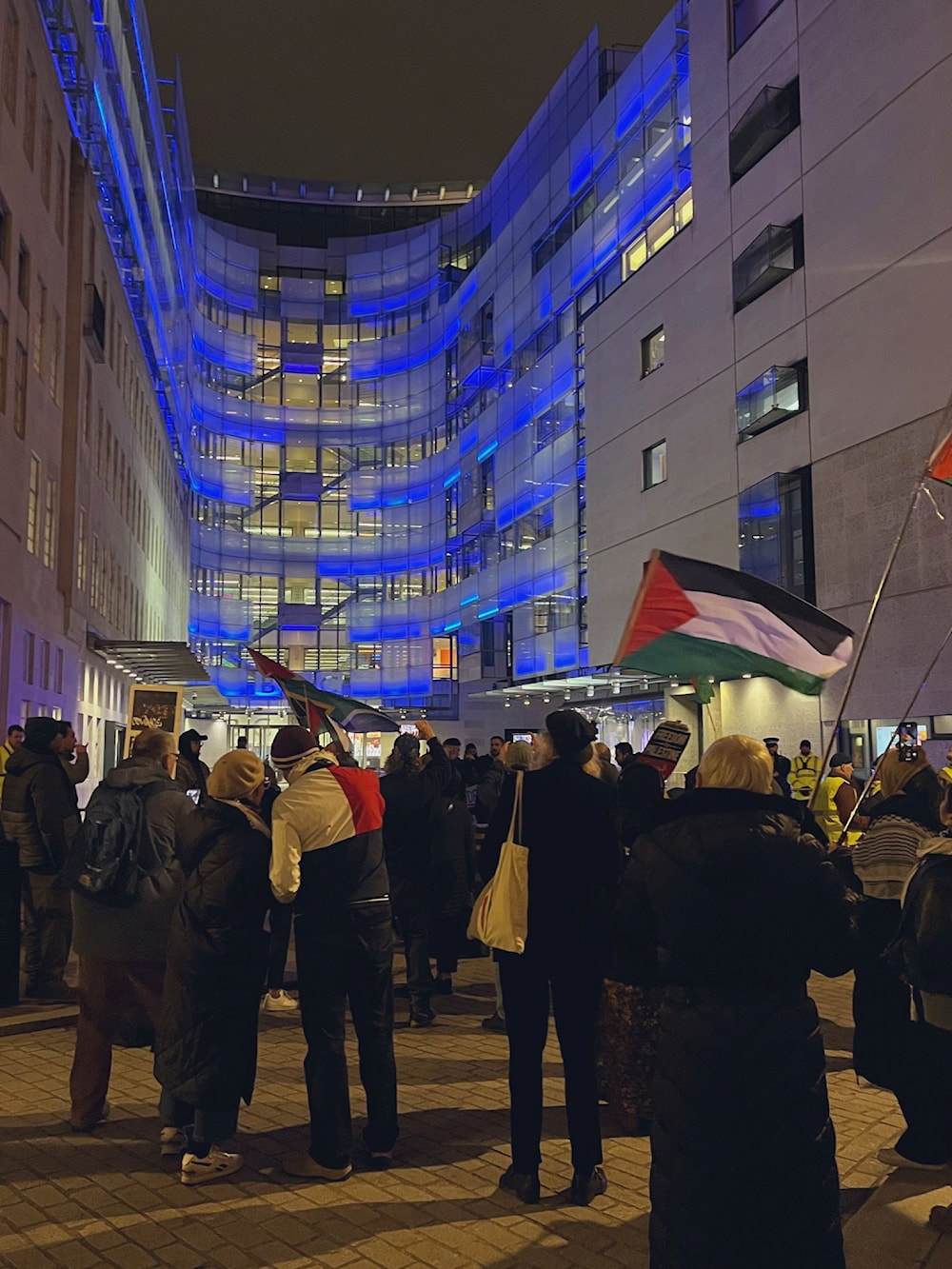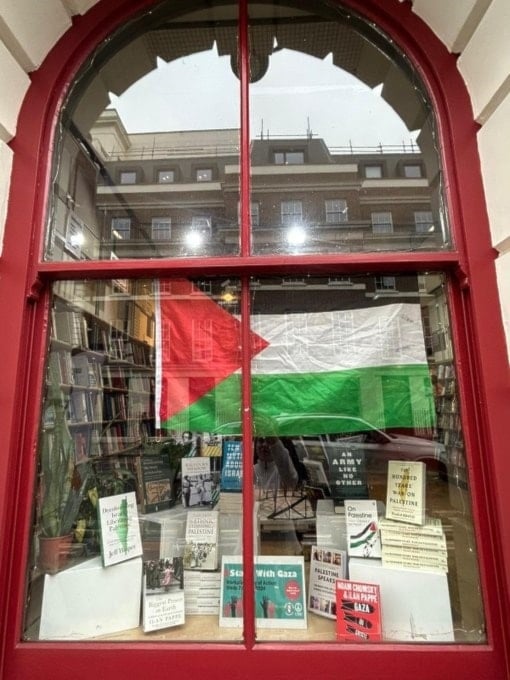Striking for Gaza
The UK government, unable to abstain from colonial meddling, remains an unfaltering sponsor of the garrison Israeli occupation.
-

Work stoppages, protests, marches and speeches, fundraising activities, and teach-outs in support of Gaza (Illustrated by Zeinab al-Hajj, Al Mayadeen English)
The message was clear: On Wednesday, February 7, workers and students across the UK were to participate in a day of solidarity with the people of Palestine. A series of actions were planned to include work stoppages, protests, marches and speeches, fundraising activities, and teach-outs. The nationwide actions were designed to pressure the British government to call for an immediate ceasefire in Gaza and to stop enabling the Israeli genocide of Palestinians.
-

Source: Stop the War Coalition
UK’s role in genocide
The UK government, unable to abstain from colonial meddling, remains an unfaltering sponsor of the garrison Israeli occupation.
As early as October 13, 2023, the British government was deploying military assets to assist in the mass murder of Palestinians. First to be dispatched to the eastern Mediterranean was a Royal Navy task force, which sat off Gaza’s shoreline, a poignant reminder of the West’s addiction to gunboat diplomacy. Accompanying the ships were three Merlin helicopters, the modified MK4 type with a roping beam to allow the rapid deployment of special forces from the helicopter’s main cabin door. Boeing P-8 Poseidon and Beechcraft Shadow R surveillance aircraft and a company of Royal Marines were also deployed.
By December, it was confirmed that some 50 surveillance missions had been flown over Gaza by the British Air Force, several lasting up to six hours over an area that is only six miles wide and twenty-five miles long. Other military aircraft movements to and from "Israel" were tracked operating from the British Air Force base in Akrotiri, Cyprus. In January, Typhoon fighter jets flew from Akrotiri on illegal bombing raids over Yemen. Israeli military aircraft have also landed at bases in the UK, their cargo was a mystery.
-

Source: Sul Nowroz
Strikes and stoppages
Strikes are a regular feature of civil resistance, particularly in the case of Palestine, with the General Strike of 1936 being the most notable.
Inspired by the nationwide fifty-day strike in neighboring Syria, which ended with a French commitment to Syrian independence, the Palestinian Arab National Committee called on Palestinians to launch a general strike in April 1936 to resist British occupation and unrestricted Jewish settlement. Village after village agreed, with workers, local committees, and religious and political leaders co-ordinating strike actions across the territory.
The British, ever fearful of the resistance spreading to other countries, responded violently.
Mass arrests were carried out, with many Palestinian men held at the Auja al-Hafir detention camp in al-Naqab desert. Houses were raided, properties were destroyed, and valuables, such as jewelry and money, were seized. By September, the British had deployed 20,000 soldiers to break the strike, which was called off in October 1936.
Solidarity across the UK
Chris Nineham, Director of Stop the War Coalition and a co-convener of the day’s actions, declared “February 7 will mark a major escalation in our campaign against Israeli genocide. It’s shaping up to be the biggest day of action yet. For the first time, people in hundreds of workplaces, universities, and colleges around the country will walk out, protest, or rally.”
Chris was right. Workplace stoppages began mid-morning, and X (formerly Twitter) was buzzing with reports of actions up and down the UK.
Postal, telecoms, and technology workers, as well as civil servants from various government departments, staged the first walkouts of the day. Healthcare and university professionals followed.
By mid-day, students had walked out of Bristol, Cambridge, Cardiff, Dundee, Edinburgh, Glasgow, Goldsmiths, Leeds, Oxford, St Andrews, and Strathclyde universities, as well as from the University of the Arts London, University of the West of Scotland, and Manchester Metropolitan University.
There were marches in Cambridge, Glasgow, Leeds, various parts of London, Nottingham, and Oxford. Large banners calling for a ceasefire were dropped from bridges.
There were vigils and speeches, including one outside the Houses of Parliament. Parents for Palestine held a press conference, during which children read out stories of suffering in Gaza.
Activists targeted companies involved with "Israel’s" military complex. There was a picket outside Barclays Bank HQ demanding they stop funding "Israel’s" genocide, and students from Sussex and Brighton Universities blocked the entrance to L3Harris, a manufacturer of arms components used by "Israel".
Others gathered at local government offices - in London and Scotland - with “Stop Arming Israel” placards. Queen Street station in Glasgow was temporarily occupied and there was a teach-out at Queen Mary University. In the evening, media workers protested outside BBC Broadcasting House.
-

Source: X Screengrab – BBC Offices
Numerous shop fronts, dressed in Palestinian flags, became beacons of solidarity. London’s famous Bookmark bookshop tweeted they were proud to be part of the national day of action.
-

Source: X Screengrab
School children walked out of classrooms and attended large rallies in Bristol, Glasgow, London, and Manchester. Others participated in smaller gatherings. Letters written and signed by students asking for a ceasefire were delivered to multiple town halls, council chambers, and offices.
Shabbir Lakha, of Stop the War Coalition, said, “We encourage children and adults from all communities to attend [today’s] events, and to use their voices to speak for safety, freedom, and peace for all.”
The International Court of Justice (ICJ) failed us all
On January 26, the ICJ acknowledged there was a "plausible" genocide occurring in Gaza. It then fell short by effectively instructing "Israel" to better police itself. In essence, the message was to keep killing, just be more discrete, stay off Tik-Tok, and gag your loudmouth government officials who frequently boast about their genocidal intentions to the world’s media. It was a shameful day for the ICJ; it was a tragic day for the rest of us as we realized that the application of international law is uneven.
On February 7, individuals from across the UK acted in the absence of a properly functioning ICJ. Workers and students rose, answering calls for solidarity, for defending humanity, and for resisting the settler colonial butchery that is being inflicted on Gaza. In October, the Palestinian General Federation of Trade Unions put out an international plea: stop those assisting the genocide and act against the companies and institutions in your country who are involved in our destruction.
Disgracefully, the call was ignored by the British government - but not by the British people.

 Sul Nowroz
Sul Nowroz
 6 Min Read
6 Min Read











